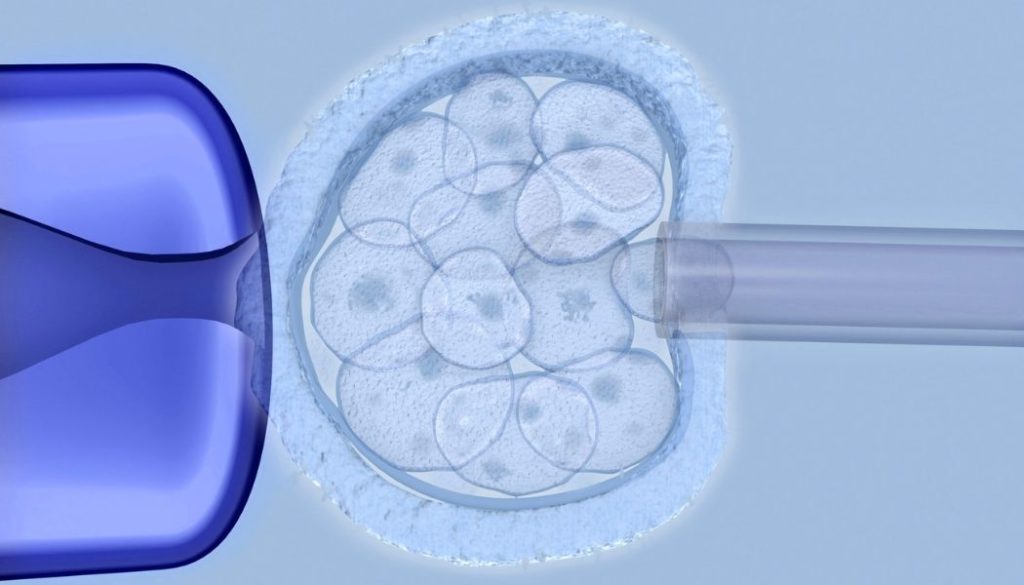As part of your surrogacy journey, you may be thinking about whether or not you should undergo embryo testing. There are several different forms of genetic testing that you may be considering, and each test serves a different and unique purpose.
Testing can take place before pregnancy and during pregnancy. One of the most common and simplest tests you can get is a carrier screening. This is to determine if you carry a genetic condition, like cystic fibrosis. Preimplantation genetic testing (PGT) is another type of genetic testing that occurs before embryo transfer. There are three types of PGT tests, which are PGT-A (aneuploidy), PGT-SR (structural rearrangement), and PGT-M (monogenic disease).
- PGT-A tests embryos for aneuploidy (i.e., missing/extra chromosomes).
- PGT-SR tests embryos for known changes in a person’s chromosomes (i.e., a chromosome flipping itself).
- PGT-M tests embryos for “single-gene disorders” that are passed down from one parent to another, such as hemophilia or fragile X syndrome.
With that being said, if the embryo has already transferred and the surrogate is pregnant, then there are other forms of genetic testing that you can consider. These tests are performed on the surrogate on the embryo, and they can be done in a few different ways. The main difference between these tests and preimplantation genetic testing, however, is that they are all performed when the surrogate has already successfully become pregnant.
These tests are performed during the early stages of pregnancy, so it’s important to consider whether or not you, as the intended parents, wish to pursue this type of testing early on in your surrogacy journey. It is important to emphasize that surrogacy itself is not something that will increase the chances of chromosomal abnormalities, nor does the age of the surrogate matter (unless the surrogate is the egg donor). However, if you (or your egg donor, if you used one) are over the age of 35, it may be a good idea to consider embryo testing. This is because your age if you are a female or the egg donor’s age increases the risk of certain genetic mutations, mainly Trisomy 21, which is the chromosomal abnormality that causes Down syndrome.
You may have many different reasons for wanting to get embryo testing. Maybe it is simply for peace of mind, or maybe it is because you are older or are a carrier for another genetic condition, like hemophilia or cystic fibrosis. Undergoing embryo testing is also a great way to prepare, both practically and emotionally, for any abnormalities that may impact your child’s life.
Here are some of the different types of embryo testing:
Invasive Diagnostic Tests
These types of tests are different from screenings because they are 100% accurate. They are also considered “invasive” because they require a procedure where a needle is inserted into the uterus to obtain samples from the fetus, which very rarely can result in pregnancy loss. And by rare, we mean rare – the chance is only between 0.2 to 0.3%. However, that small percentage is still a risk, and your decision is completely valid as to whether or not you wish to move forward with it.
Invasive diagnostic tests may include:
- Chorionic villus sampling
- Amniocentesis
Chromosomal Abnormality Screenings
On the other hand, chromosomal abnormality screenings do not require any risk. They may be performed as blood tests, ultrasounds, or cell-free DNA tests. Even though these screenings come with no risk, they are not 100% accurate. Blood tests, for instance, can detect up to 91% of cases of Trisomy 21 in fetuses, and there is roughly a 5% chance that the test will indicate a false positive, meaning a family is told that their baby will have Down syndrome, even though it is completely healthy.
Chromosomal abnormality screenings may include:
- Blood test
- Ultrasound to detect physical markers of genetic abnormalities (i.e., nuchal thickening, shortened femur, etc. for Trisomy 21)
- Cell-free DNA tests
With that in mind, here are some things you may want to consider when deciding whether or not embryonic testing is right for you:
- Am I or is my egg donor over the age of 35?
- Will I feel better knowing the chances of my child living a normal life?
- Am I prepared to handle finding out that my child may have a genetic abnormality?
- Can I afford the cost of embryo testing?
- Will embryo testing help give me better peace of mind?
Whether or not you would like to pursue embryo testing as part of your surrogacy journey is entirely up to you. It’s important to consider the risk factors of each procedure, as well as the chances that your child will have a chromosomal abnormality. For many, embryo testing gives parents greater peace of mind. Plus, as an added bonus, you can also find out the sex of your baby earlier!

